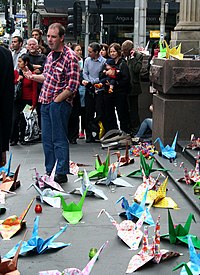Jim Green (activist): Difference between revisions
m added an image |
Issues |
||
| Line 50: | Line 50: | ||
}} |
}} |
||
'''Jim Green''' is the national [[anti-nuclear]] campaigner with [[Friends of the Earth Australia]] and Australian coordinator of the Beyond Nuclear Initiative.<ref>[http://www.foe.org.au/anti-nuclear/media/news-items/2008/forum-nuclear-power-renewables-or-clean-coal-energy-options-for-australia Nuclear Power, Renewables or Clean Coal? Energy Options for Australia]</ref> Green is a regular media commentator on nuclear waste issues.<ref>[http://www.abc.net.au/rn/perspective/stories/2008/2153906.htm Nuclear waste and indigenous rights]</ref> He has an honours degree in public health and was awarded a PhD in [[science and technology studies]] for his analysis of the [[High Flux Australian Reactor|Lucas Heights]] research reactor debates.<ref>[http://www.energyscience.org.au/contacts.html EnergyScience Coalition] energyscience.org.au</ref> |
'''Jim Green''' is the national [[anti-nuclear]] campaigner with [[Friends of the Earth Australia]] and Australian coordinator of the Beyond Nuclear Initiative.<ref>[http://www.foe.org.au/anti-nuclear/media/news-items/2008/forum-nuclear-power-renewables-or-clean-coal-energy-options-for-australia Nuclear Power, Renewables or Clean Coal? Energy Options for Australia]</ref> Green is a regular media commentator on nuclear waste issues.<ref>[http://www.abc.net.au/rn/perspective/stories/2008/2153906.htm Nuclear waste and indigenous rights]</ref> He has an honours degree in public health and was awarded a PhD in [[science and technology studies]] for his analysis of the [[High Flux Australian Reactor|Lucas Heights]] research reactor debates.<ref>[http://www.energyscience.org.au/contacts.html EnergyScience Coalition] energyscience.org.au</ref> |
||
==Issues== |
|||
Jim Green and Peter Karamoskos say there is growing scientific confidence in the [[Linear no-threshold model]] for ionising radiation, which is supported by the 2006 report of the Committee on the Biological Effects of Ionising Radiation (BEIR) of the US National Academy of Sciences.<ref name=kargreen>{{cite web |url=http://www.abc.net.au/unleashed/56842.html |title=Do we know the Chernobyl death toll? |author=Peter Karamoskos and Jim Green |date=18 April 2011 |work=The Drum }}</ref> The BEIR report comprehensively reviewed available data and concluded that: |
|||
<blockquote> |
|||
The balance of evidence from epidemiologic, animal and mechanistic studies tend to favour a simple proportionate relationship at low doses between radiation dose and cancer risk... The risk of cancer proceeds in a linear fashion at lower doses without a threshold and… the smallest dose has the potential to cause a small increase in risk to humans.<ref name=kargreen/> |
|||
</blockquote> |
|||
According to Green and Karamoskos, the alternative view, that low-level radiation is harmless, is limited to a small number of scientists "whose voice is greatly amplified by the nuclear industry". In Australia, for example, "uranium mining and exploration companies such as Toro Energy, Uranium One and Heathgate Resources have sponsored speaking tours by scientists who claim that low level radiation exposure is not only harmless but actually good for you".<ref name=kargreen/> |
|||
==Further reading== |
==Further reading== |
||
Revision as of 03:03, 19 April 2011
Jim Green | |
|---|---|
 Green at the Melbourne's GPO in March 2011 | |
| Nationality | Australian |
| Education | Ph.D. |
| Alma mater | University of Wollongong |
| Occupation | Activist |
| Known for | Australian coordinator of the Beyond Nuclear Initiative |
Jim Green is the national anti-nuclear campaigner with Friends of the Earth Australia and Australian coordinator of the Beyond Nuclear Initiative.[1] Green is a regular media commentator on nuclear waste issues.[2] He has an honours degree in public health and was awarded a PhD in science and technology studies for his analysis of the Lucas Heights research reactor debates.[3]
Issues
Jim Green and Peter Karamoskos say there is growing scientific confidence in the Linear no-threshold model for ionising radiation, which is supported by the 2006 report of the Committee on the Biological Effects of Ionising Radiation (BEIR) of the US National Academy of Sciences.[4] The BEIR report comprehensively reviewed available data and concluded that:
The balance of evidence from epidemiologic, animal and mechanistic studies tend to favour a simple proportionate relationship at low doses between radiation dose and cancer risk... The risk of cancer proceeds in a linear fashion at lower doses without a threshold and… the smallest dose has the potential to cause a small increase in risk to humans.[4]
According to Green and Karamoskos, the alternative view, that low-level radiation is harmless, is limited to a small number of scientists "whose voice is greatly amplified by the nuclear industry". In Australia, for example, "uranium mining and exploration companies such as Toro Energy, Uranium One and Heathgate Resources have sponsored speaking tours by scientists who claim that low level radiation exposure is not only harmless but actually good for you".[4]
Further reading
PhD thesis
- (1997) "Reactors, Radioisotopes & the HIFAR Controversy" (Department of Science & Technology Studies, University of Wollongong, Australia)
Recent publications
- (2005, September) "Nuclear Power: No Solution to Climate Change"
- (2006) "Australia, Uranium and Nuclear Power", International Journal of Environmental Studies, 63 (6), pp 845–857 (with J. Falk and G. Mudd)
- (2006, November 24) "No to Howard's nuclear madness", Green Left
- (2007 August 3) "James Lovelock and the big bang", Green Left
- (2007, November 2) "Nuclear power and water scarcity", Green Left (with Sue Wareham)
- (2009, 25 October) Nuclear debate: A dangerous option that wont solve climate change Green Left.
See also
References
- ^ Nuclear Power, Renewables or Clean Coal? Energy Options for Australia
- ^ Nuclear waste and indigenous rights
- ^ EnergyScience Coalition energyscience.org.au
- ^ a b c Peter Karamoskos and Jim Green (18 April 2011). "Do we know the Chernobyl death toll?". The Drum.
